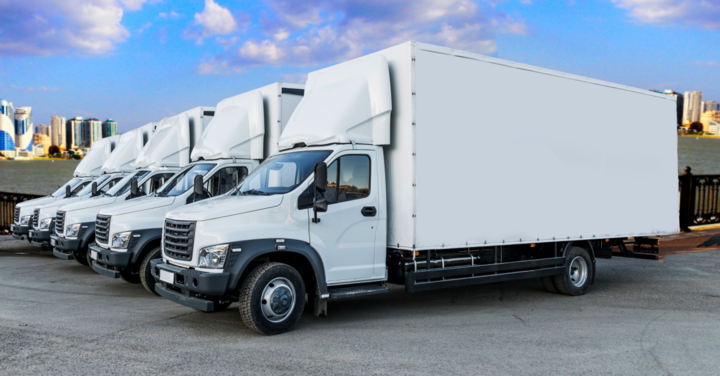
The box truck goes by many other names — a straight truck, a cube truck, a rolling toaster, a cube van — and probably a few others that aren’t printable when things are going pear-shaped. But, by any name, the box truck is a crucial part of transporting products, be it moving your belongings to a new house across town or shipping your goods to consumers across the country. This in-depth look at box trucks will provide everything you need to know about these vehicles — including a definition, their dimensions, their qualities, and what advantages a box truck brings to certain jobs.
A box or straight truck is a rectangular-shaped truck with a single frame that extends the length of the truck and with axles attached to the frame. The cargo area is also attached to the frame. Pickup trucks and dump trucks are not really considered box trucks. The door in the back of a box truck usually operates like an overhead garage door. Straight trucks are often used to transport boxes, furniture, and large appliances. At some point, most of us have used a box or straight truck during a move from one residence to another. But recently, they have become an indispensable piece in supply chains, helping companies move cargo cost-efficiently and in a timely manner.
Box trucks can function like dry van trailers in the shipping world. Box trucks can be used to move non-perishable and dry goods, from retail and consumer products to electronics to machine parts and even palletized freight. Except for their total length, box trucks have similar internal dimensions to trailer trucks. Thus, they can move less-than-truckload (LTL) or partial quantities of traditional dry van cargo.
The most stand-out differences between box trucks and tractor-trailers are how they look and how much they can hold. While the box truck is one entire frame unit, the tractor-trailer consists of the cab unit and the trailer that can be added or removed. With a straight truck, the container is attached to the truck’s frame and must be unloaded before taking on a new shipment. With a tractor-trailer, the trailer can be removed, dropped off at a location, and switched out with another trailer that holds new cargo to be transported to another destination. Also, tractor-trailers are longer in length, meaning they have more room to take full truckloads or, in some cases, two or more partial truckloads. For a box truck, those loads would be too big to fit in the smaller containers.
Straight trucks can vary in size, some as short as 10 feet. But most transportation firms usually use box trucks ranging between 22 and 26 feet. Most box trucks are 96 inches wide by 96 inches tall and have a cargo weight capacity of 8,000 pounds. By comparison, tractor-trailers — also known as big rigs, 18-wheelers, or semi-trucks — have standard trailer lengths of 48 feet or 53 feet and wide sizes of 102 inches or 96 inches. The maximum weight of a trailer truck is 80,000 pounds gross vehicle weight, 20,000 pounds on a single axle, and 34,000 pounds on a tandem axle group.
Box or straight trucks can be perfect for less-than-truckload (LTL) freight. Those types of LTL freight include parcel delivery or product hauling. Box trucks are also quite popular for moving households, delivering printed newspapers, and transporting appliances. But the truck’s capacity and ability to get the product in and out often are the decision-makers. Box trucks can only be used for cargo capable of being loaded from the back via forklift, pallet jack, or hand. And remember, not all box trucks come equipped with lift gates, and without one, that could make cargo transfer a more demanding task. If that is a concern, shippers should stipulate in the agreement whether the box truck has a lift gate or not.
There are quite a few advantages to using a box truck for freight shipping:
Versatility and cost-saving ability can make box trucks a clear option in the freight shipping world. The same can be said of Zengistics. With its expertise and its invaluable tech stack, Zegenistics is your 3PL of choice for multi-model execution. Operating on the world’s first collaborative logistics platform, Zengistics is a technology company that can optimize your supply chain nationwide with data-driven solutions and proactive communication along with the highest level of customer service. Regardless of your need — box truck, LTL, truckload, intra-Canada, cross-border — Zengistics can procure capacity, execute, and manage by exception. To find out more about Zengistics and get a quote, check out our website.